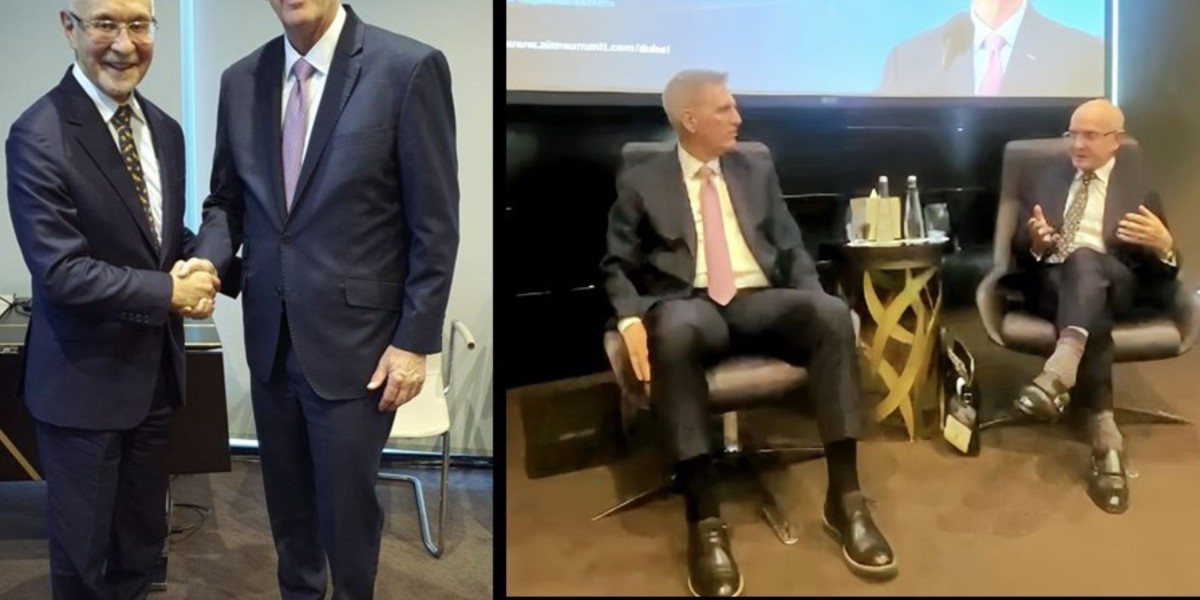The global economy is navigating through turbulent waters marked by sovereign debt challenges, rising political polarization in Western democracies, and economic volatility in emerging markets. At the prestigious AIM Summit Dubai 2025, former U.S. House Speaker Kevin McCarthy delivered powerful insights on these interconnected issues, sparking meaningful dialogue on the state of the global financial landscape.
This blog explores McCarthy’s perspectives, focusing on the sovereign debt crisis analysis, the political divides reshaping governance, and the emerging market trends that are redefining the future of global trade and investment.
Kevin McCarthy’s Sovereign Debt Discussion
One of the most pressing topics McCarthy addressed at AIM Summit Dubai was the sovereign debt crisis facing both developed and developing nations. With debt-to-GDP ratios at historic highs, nations across the globe are grappling with repayment risks, rising interest rates, and limited fiscal flexibility.
McCarthy highlighted how the U.S., despite being the world’s largest economy, faces mounting debt concerns that could undermine its global influence. He argued that unchecked government spending, coupled with rising borrowing costs, creates long-term vulnerabilities.
For emerging markets, the challenge is even greater. Many economies in Africa, Asia, and Latin America are heavily reliant on foreign borrowing. As global interest rates climb, these countries are experiencing rising default risks and growing reliance on international financial institutions.
Key takeaway: Without decisive reforms, the global sovereign debt crisis could escalate into a systemic threat to global financial stability.
Global Sovereign Debt Crisis Analysis
The global sovereign debt crisis analysis presented at AIM Summit underscored the interconnectedness of today’s financial systems. McCarthy emphasized how debt challenges in one region can quickly spill over into others through capital markets, trade flows, and investor confidence.
For instance, European nations struggling with debt repayments could reduce imports from emerging markets, while a slowdown in China could intensify global supply chain disruptions. McCarthy stressed that coordinated international action is critical to mitigate these risks.
Solutions such as restructuring debt, encouraging public-private partnerships, and increasing transparency in government borrowing practices were suggested as long-term strategies to restore balance.
Political Polarization in Western Democracies
Beyond economic concerns, McCarthy also addressed the issue of political polarization in Western democracies, particularly in the United States and Europe. He noted that partisan divides have intensified, making it increasingly difficult to reach consensus on critical issues such as fiscal responsibility, trade policy, and foreign relations.
In the U.S., polarization has slowed decision-making on essential policies needed to address the sovereign debt burden. Similarly, European democracies are witnessing growing fragmentation, with populist movements challenging traditional governance models.
McCarthy argued that without bipartisan and cross-party collaboration, nations risk policy stagnation that could exacerbate both economic and social instability.
Insight: Political polarization is not just a governance issue—it directly influences how economies respond to crises like the sovereign debt challenge.
Emerging Market Trends at AIM Summit
One of the highlights of McCarthy’s address was his perspective on emerging market trends at AIM Summit. Despite global challenges, he expressed optimism about the resilience of emerging economies, particularly in Asia, the Middle East, and Africa.
Key trends he identified include:
Diversification of Trade: Emerging markets are reducing dependence on Western economies and building stronger South-South trade networks.
Technological Innovation: Fintech, AI, and digital infrastructure are transforming how emerging economies attract investment and create new opportunities.
Energy Transition: Many emerging markets are positioning themselves as leaders in renewable energy and green finance.
Demographic Advantage: Young populations in Africa and South Asia are becoming engines of consumption and innovation.
McCarthy emphasized that global investors should pay close attention to these emerging market trends, as they could shape the next wave of economic growth and investment opportunities.
Why Kevin McCarthy’s AIM Summit Insights Matter
Kevin McCarthy’s insights at AIM Summit Dubai 2025 serve as a critical reminder that economic, political, and social issues cannot be viewed in isolation. The sovereign debt discussion, the rise of political polarization, and the opportunities within emerging markets are deeply interconnected.
For policymakers, these insights provide guidance on designing effective fiscal and governance strategies. For businesses and investors, they highlight both the risks of economic volatility and the opportunities for growth in new markets.
Conclusion
The AIM Summit Dubai 2025 provided a vital platform for global leaders to address the pressing challenges of our time. Through his global sovereign debt crisis analysis, Kevin McCarthy urged nations to confront their debt burdens with urgency, while warning of the risks posed by political polarization in Western democracies. At the same time, his optimism about emerging market trends offers hope for a more balanced and resilient global economy.
As the world navigates economic uncertainty, McCarthy’s perspectives highlight the importance of collaboration, reform, and forward-looking strategies to ensure stability and growth.








